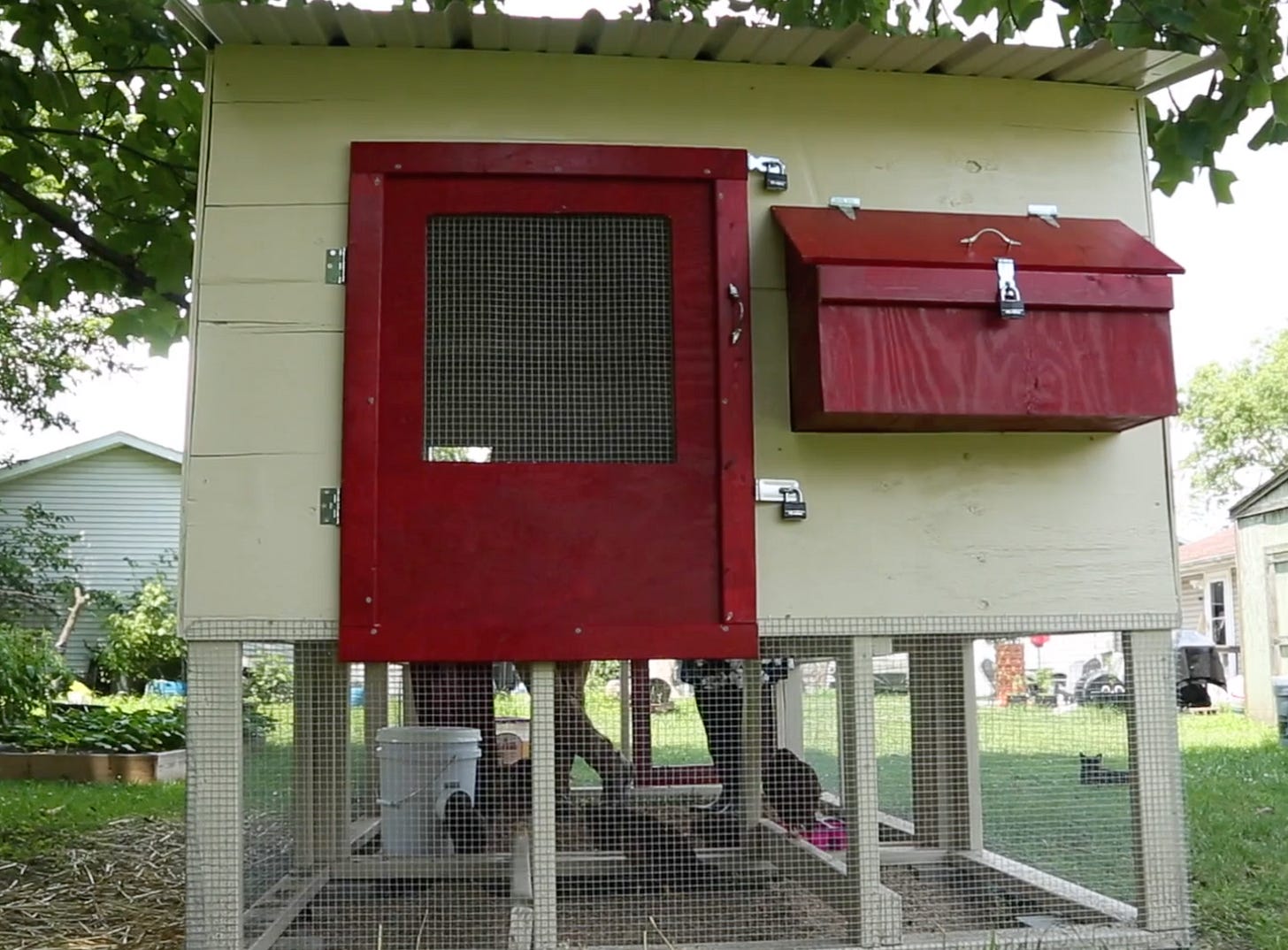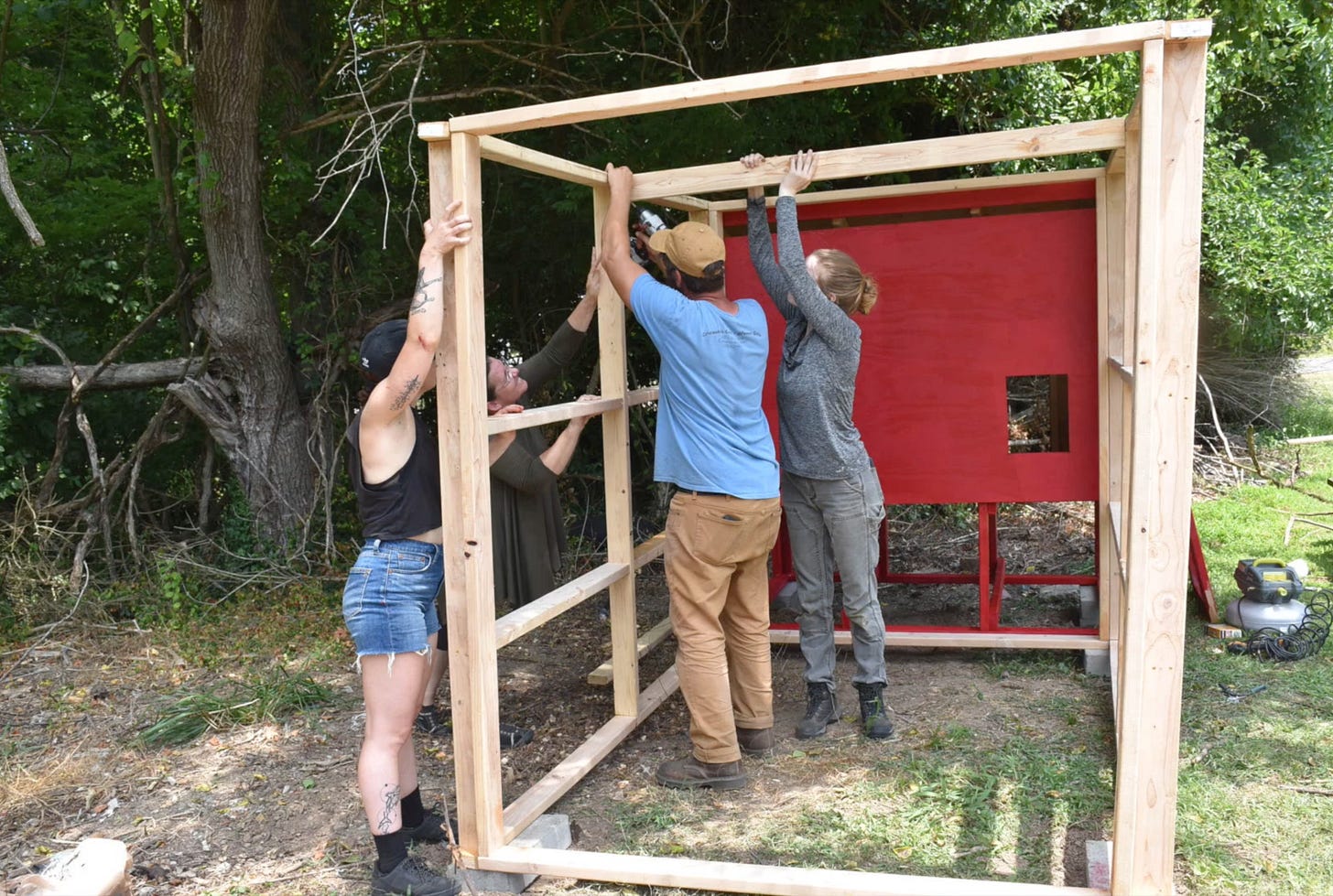In the early weeks of Covid, a group in Carbondale, Illinois received a small grant to expand their food autonomy efforts. They developed the Chicken Tenders project, which designed and built 12 chicken coop kits to be distributed around the city.
Chicken Tenders was an inspiration for our #1400Challenge, which responded to the pandemic by inviting people to develop and share projects to build collective resilience and power with their stimulus checks. In addition to food autonomy projects like New World Growers and Lobelia Commons’ decentralized nursery operating in parallel to this chicken coop network, we also received #1400challenge plans from Sawhorse Revolution for a pallet house (with one later built in the Weelaunee Forest in Atlanta), along with recipes for sound systems, mesh networks, and community gyms.
At the time of the #1400Challenge we never released the designs and budget for the Chicken Tenders coop but have now received an updated project bundle which we are publishing now as a practical example for how hubs could collectively coordinate egg production to address the egg shortage and inflation crisis from below.
In addition to building these coops together, we urge you to consider integrating chicken tending and egg production into broader plans for food autonomy. Could a neighborhood coop be integrated into a squatted orchard or a community garden? Are there food scraps that could be collected from a weekly dinner and fed to the chickens to reduce dependence on commercial feed? What must we build to help us overcome the limits we face together, locally and on a global scale?
Here’s how it worked: teams of volunteers produced the kits in a local warehouse, distributed and helped assemble them at households free of charge—the only condition was that a house receiving a coop with six chickens would share surplus eggs with their neighbors. Meanwhile, 300 newly hatched chicks were purchased from a hatchery and cared for at a local farm until their new homes were built.
Volunteers and coop recipients with their neighbors and friends joined together in assembling and painting the coops, picking up and delivering the new chickens, and sharing the eggs themselves. Each coop was not only a concrete measure to reduce a household’s dependency on precarious and uneven food systems, but something that began to connect neighbors with each other at a time when isolation felt at an all-time high.
In total, 12 coops were built for around $6000, each taking three days to assemble. A group could easily repeat, extend, and innovate on this project by accepting sliding scale donation or by connecting it to other local initiatives.
Here is a short documentary made by a participant in the project:
What we’re reading
Daniel Grave argues that the shared dignity we built through mass uprising in 2020 has propelled the ruling class into a conspiracy against the unfolding of a decent world in Monstertutional Conarchy.
Lake Effect, an exciting collective experiment in Chicago responds to Monstertutional Conarchy, and ends up laying out the best account we’ve seen of the Trump presidency.
Joan Westenberg draws out the broader context of the Trump malaise and current prospects for rupture.
Shakara Tyler helps Octavia Butler continue to shed light on our tense experience of utopia and dystopia curling together in 2025, via reflections peasant agroecology practices.
Earth Uprisings finally lays out in practical terms the forms it uses to organize slow territorial struggles against capitalist infrastructure and rapid, mass mobilizations to disarm cement factories and private water basins.
Patrick Lyons draws out the commune form’s “continuing supple openness to collective improvisation and to creative and practical confrontations with the situation immediately at hand.”
Juliana Spahr organized Commune Editions with Joshua Clover. Now she offers a beautiful tribute to his life and revolutionary activities in the wake of his early death. J Clo also taught us to refuse to die.
Heatwave is an exciting new publishing project, and their analysis of the flooding crisis in Valencia is spot-on.
This text has been syndicated from Inhabit: Territories.


